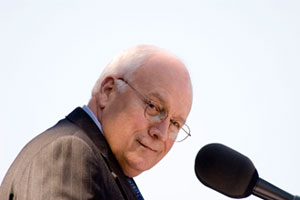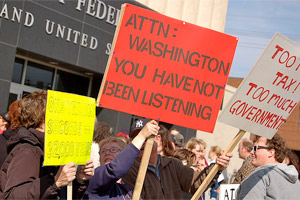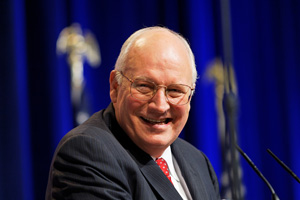
Earl Cryer/Zumapress.com
Dick Cheney is routinely touted as the most influential vice president in US history. But within the GOP these days, he has little sway—or so it would appear from his role in the race to elect a new chairman of the Republican National Committee.
In early December, Cheney made news when he waded into the contentious RNC battle. A half-dozen potential candidates were considering a challenge to current chairman Michael Steele, who has fallen out of favor with many RNC members over his handling of the party’s affairs, and Cheney decided to throw his weight behind one of them: former Bush administration official Maria Cino.
Cheney headlined a December fundraiser for Cino hosted by Republican pundit Mary Matalin and also backed by Ed Gillespie, former counselor to President George W. Bush. In theory, Cheney’s high-profile endorsement should have been a boon for Cino, who was challenging an incumbent but unpopular chairman. But by early January, when all the RNC candidates gathered in Washington for a debate hosted by Americans for Tax Reform, Cino was running dead last in a heat of five, according to most of the early whip counts.
Cino’s poor showing in the RNC race begs the question of how much influence the former vice president still wields within his own party. According to a quick survey of debate attendees and participants, the answer is: not that much. When I asked Steele himself about Cheney’s endorsement of his opponent, he laughed heartily and said, “It is what it is.” He said he believed RNC members are “not easily moved by those things” and indicated that Cheney’s endorsement wasn’t having much of an influence on the race.
Steele, who is expected to lose his bid for reelection, wasn’t just trying to put a better light on his own prospects. The same sentiment was echoed by other RNC members as well. Morton Blackwell, who has been Virginia’s Republican national committeeman since 1988 and is a member of the RNC executive committee, told me, “Dick Cheney has many strengths, but influencing internal Republican Party politics is not one of the areas he has been involved in.”
Like Steele, Blackwell believed Cheney’s endorsement wouldn’t have much of an effect on the outcome of the race, in part because Cheney picked a candidate who was not a current or recent member of the RNC. Blackwell said that it would be unprecedented for the RNC to pick someone outside the club in a year when Republicans don’t occupy the White House. Cino has never been an RNC member, even though she was its deputy chair in 2004. Blackwell also revealed that Cheney doesn’t seem to be working all that hard to get Cino elected. He said he has not been contacted by Cheney about his vote, which is going to Saul Anuzis, the former head of the Michigan GOP and a tea party favorite.
Grover Norquist, head of Americans for Tax Reform, who moderated Monday’s RNC chair debate, pointed out that Cheney’s endorsements have not panned out recently. In the GOP primary for Texas governor, he noted, Cheney endorsed Kay Bailey Hutchison, who lost badly to incumbent Rick Perry. Cheney also backed Trey Grayson in the GOP primary to fill the seat of retiring Kentucky Sen. Jim Bunning, which ultimately went to tea party fave Rand Paul. “I don’t know that he has a track record with endorsements,” said Norquist.
Norquist allowed that while Cheney’s endorsement probably didn’t help Cino win any votes with the RNC, it may have helped her raise some money. Norquist estimated that it probably takes at least $50,000 to $100,000 to travel the country to meet with all the RNC members and pitch a candidacy to them, and Cheney probably helped considerably in raising those funds for Cino. Cino herself confirmed this after Monday’s debate when I asked her how the former vice president had specifically helped her campaign. After offering some boilerplate about her long friendship with the Cheney family, she said the endorsement had allowed her to raise money to fund her campaign.
But Cheney seems to be out of step with the current political climate, and the tea party movement in particular. His endorsement of Cino, while perhaps demonstrating loyalty to former Bush campaign foot soldiers, suggests he really doesn’t know how to pick a winning candidate these days. After all, Cino has been lambasted by tea party activists for a serious transgression against conservative orthodoxy, namely that she had been a lobbyist for Pfizer, the pharma giant whose CEO lobbied hard to help pass President Obama’s health care reform legislation. She’s often referred to in conservative blogs as the “Obamacare lobbyist.” During Monday’s debate, she was asked directly about whether she lobbied for Obamacare. Her clumsy denial prompted real grumbling from what was an otherwise pretty tame crowd.
Cheney’s endorsement and involvement in Cino’s campaign also has complicated her attempts to woo social conservatives, who are lukewarm on Cheney these days but remain a powerful force at the RNC. The anti-gay-marriage National Organization for Marriage (NOM) helped vet questions for Monday’s debate, so naturally one of the big social issues at the heart of the debate involved same-sex marriage. All of the other candidates emphatically asserted their belief in traditional marriage and bashed activist judges who had granted same-sex unions. But Cino, who’s unmarried, was in bit of a bind on the question given that one of the organizers of her campaign committee is Cheney’s daughter Mary, a lesbian who has been in a long-term relationship with a woman with whom she has two children. Cino’s answer to the gay marriage question was succinct: “I believe in traditional marriage…I support the Republican platform.”
It wasn’t exactly a ringing endorsement, and during the debate, which was attended by NOM leaders Maggie Gallagher and Brian Brown, NOM tweeted that Cino had earned a “C-” on her answer to the marriage question; the group suggested that she had not demonstrated sufficient opposition to same-sex marriage.
Still, Cino’s opponent, Saul Anuzis, said he thought Cheney’s endorsement hadn’t effected the RNC race one way or another, though he was quick to add that he would have been “honored” to have Cheney’s backing. The reason for the lack of any Cheney magic, he believes, is that the ex-VP’s involvement comes at a time when the RNC members don’t want a Beltway veteran running the show. The Cheney endorsement only highlighted the fact that Cino, he said, is “the quintessential Washington insider.”












